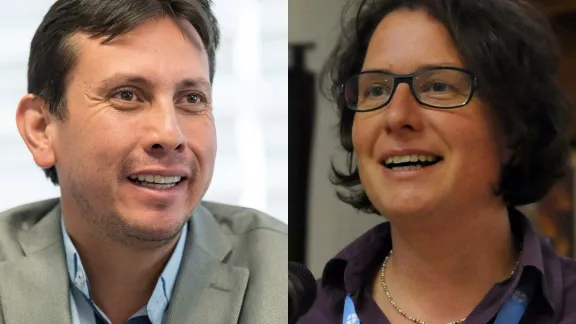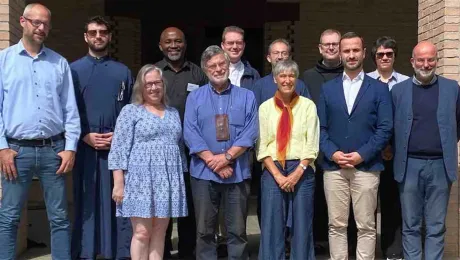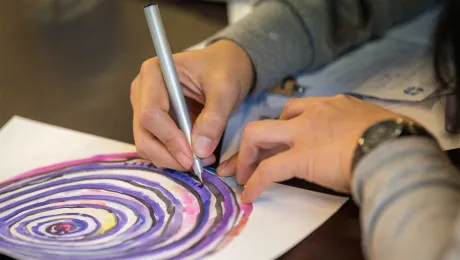
Rev. Atahualpa Hernandez, Bishop President of the Evangelical Lutheran Church of Colombia, and Rev. Dr Simone Sinn, professor of ecumenical theology at the Bossey Ecumenical Institute. Photos: LWF/Albin Hillert and LWF/A. Danielsson
Webinar explores ways of engaging, witnessing, accompanying processes of dialogue and reconciliation
(LWI) - From the challenge of Latin American churches seeking paths of peace and reconciliation, to Lutherans in the global north struggling with divisive moral and ethical issues, participants in a ‘Being Lutheran’ webinar on 2 December discussed ways of discerning the spirits of our age.
The online discussion was the sixth in a monthly series bringing together theologians and others engaged in an ongoing study process to explore contemporary Lutheran identities. The webinar was moderated by the Lutheran World Federation’s Program Executive for Identity, Communion and Formation, Rev. Dr Chad Rimmer.
In an opening reflection, Rev. Dr Simone Sinn, professor of ecumenical theology at the Bossey Institute and member of the World Council of Churches (WCC) Faith and Order Commission, noted that all engagement in the public square requires discernment and an ability to distinguish between worldly and spiritual issues.
Quoting from Martin Luther’s treatise on Christian freedom, published 500 years ago, she affirmed that the Gospel is “a message of liberation which frees us up” so that “all our energy and attention can be freely given to others.” Lutherans are renowned as people who “roll up their sleeves and engage with the most complex and challenging issues of the day,” she noted, in order to serve others and “to be part of the transformation process.”
Discerning as community
Turning to the tools that Lutherans can draw on for this discernment process, she listed the traditional instruments of scripture, catechism, hymns and sacraments, but also the contemporary sources of scientific knowledge which can help to develop our understanding of an issue. She highlighted the important communal dimension of discernment, stressing the need for participation of those most closely affected by the issues under discussion.
Speaking from a Latin American perspective, Rev. Atahualpa Hernandez, Bishop President of the Evangelical Lutheran Church of Colombia, reaffirmed that perspective by sharing the challenges of working for peace in a country that has experienced over half a century of civil war. He recalled that in the 2016 referendum to ratify a peace deal, over half the country voted against it, noting that being a “Christian country” is “no guarantee that we are coherent with our calling to be ambassadors of peace.”
He spoke of the difficulties of witnessing and discerning the spirits in a country where Catholics continue to receive “privileged treatment” and where Lutherans and other mainline Protestants struggle to distinguish themselves from fast-growing prosperity Gospel churches. The key, he said, is to find ways of “embodying our theology” and putting our gifts at the service of those most affected by the violence and conflict.
Continuity and change
Dr Sinn shared the work of the WCC which produced a first moral discernment document in 2013 and is currently concluding work on a second publication dealing with continuity and change. “Whenever the church reaches out to those facing discrimination, it may come to conclusions that others find difficult to accept,” she said. She pointed to past developments of church doctrine over issues of slavery, apartheid, war and peacebuilding, as well as current divisions over inclusion of the LGBTQI community.
Rev. Sinn stressed that such discernment processes take time and churches at local and national level must facilitate spaces for people to engage and listen to each other. “Christian life is not just about implementing moral norms but about responding in love to the most vulnerable,” she insisted.
We are in a process of learning and we seek to respond in love.
Bishop Hernandez noted that the church can witness best by accompanying and walking alongside those seeking dialogue and reconciliation. In the context of violence, he said, “we don’t consider ourselves better than others and we don’t have the answers,” but rather “we are in a process of learning” and “seek to respond in love.”
The Columbian church leader concluded with a concrete example of reconciliation that he took part in on the first Sunday in Advent, as former rebel fighters and members of indigenous communities came together to share their stories of pain and conflict. Participants broke a plate to symbolize the violence and brokenness of their society, but were then invited to find ways of sticking the pieces back together again. “I saw young children taking part in this activity,” he said. “It’s difficult to quantify this and you can’t write it in a report,” he added, “but it was a symbol of hope.”
LWF/P. Hitchen


